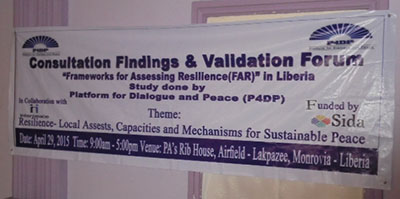Recognizing the resilience of Liberians

-The Platform for Dialogue and Peace (P4DP) held a Validation Forum to discuss how the existing strengths in Liberian society can contribute to peacebuilding programmes and policies-
"When you have a society that has the conditions to create the vision, then you can move forward in the face of the threats."
Recently, the Platform for Dialogue and Peace (P4DP), Interpeace's partner organization in Liberia, organized a one day Validation Forum on the theme of Resilience for Peacebuilding. This event was the culmination of eight months of participatory research conducted throughout the country and is part of Interpeace's Frameworks for Assessing Resilience (FAR) project. P4DP documented the resilience mechanisms that Liberians draw on in order to overcome and prevent violent conflict and remain united.
The Validation Forum brought together participants from different sectors of society – representatives from various ministries, members of the House of Representatives, traditional chiefs, religious leaders, civil society organizations as well as participants from the fifteen counties of Liberia. This diverse audience, deliberately convened to be representative of Liberian society, was asked to validate the findings presented during the event. There was a strong appreciation and affirmation of the research by participants, including by Hon. Morris Dukuly, Minister for Internal Affairs who said that this research resonated because it acknowledged "the difficult past of Liberians coupled with their determination to grapple with their realities and that it cannot be over emphasized that they are resilient people."
James Suah Shilue, Executive Director of P4DP added that this research on resilience was a good fit with the participatory research methods that the organization has adhered to since its inception: "Researchers become students of the participants consulted.," The P4DP researchers learn from fellow Liberians what capacities and strategies they possess. "We were interested in finding out what has enabled us to overcome years of conflict, continued hardship, and most recently, the devastating Ebola crisis." Going further, a participant, attending on behalf of the Governance Commission, added that resilience changes the perspective on peacebuilding as it helps us to "see the glass half full instead of half empty." This is important because "when you have a society that has the conditions to create the vision, then you can move forward in the face of the threats."
Graeme Simpson, Director of Interpeace USA, present at the event, noted that it was important to view resilience as "not only remedial, but also preventive; While going back to normal, bouncing back from Ebola, is in itself to be applauded, it is even more important that if Ebola struck again tomorrow, we are prepared." Echoing this concern, participants acknowledged that the consultation phase had accurately captured where the strengths of Liberians reside: in communities and traditional structures as well as innovation and perseverance of individuals. On the other hand, participants were keen to see concrete policies and actions developed that take the findings of the research into account.
In order to deepen the research and formulate policy recommendations and a programme of action to strengthen resilience against possible relapse to conflict, P4DP will now initiate a multi-stakeholder dialogue process with a select group of individuals representing different sectors of society.. Over the coming months, this working group will meet regularly and with support and facilitation from P4DP, will draw on their expertise to deepen the research on the sources of resilience identified during the consultation phase. They will develop recommendations on how these can be strengthened and harnessed to consolidate peace and enhance the capacity of Liberians to manage future shocks and mitigate fragility.
Download the Executive Summary of the findings.
